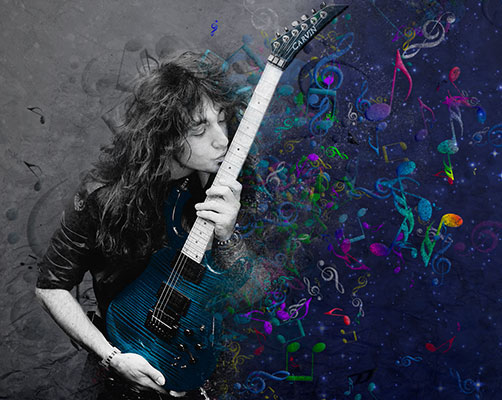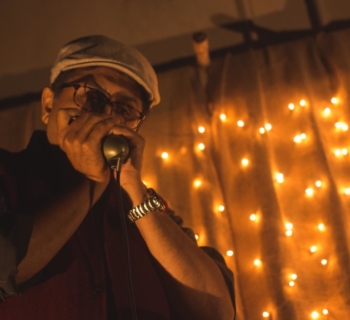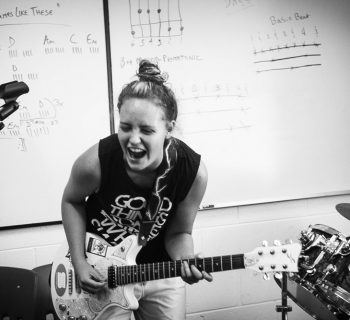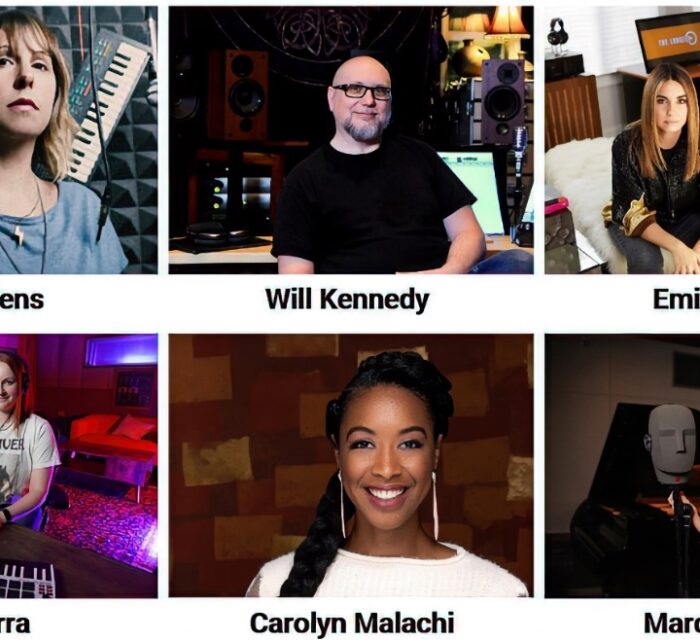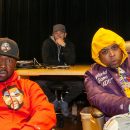Songwriter, behavioral scientist and co-founder of Aussie band skinsNbones, Bones has compiled a list of video documentaries, available online, that offer fascinating, useful advice and insights about the therapeutic power of music. Check 'em out:
HOW MUSIC CAN HEAL OUR BRAIN AND HEART
Music Therapists join with Neurologists to use the power of music with great success in addressing stress, pain and fear, plus helping with speech, language, cognition and movement.
"Working with the magic and power of music, and the power and information that comes from science, embedded in a clinical relationship that's built on compassion, empathy, being of service to our fellow humans - it's a really beautiful way to work."
Kathleen M. Howland is a certified Music Therapist and licensed Speech Language Pathologist who teaches at Berklee College of Music and the Boston Conservatory in Music Therapy, Neuroscience and Positive Psychology.
ALIVE INSIDE: A Story of Music and Memory
After listening to music of his era, Henry, a normally unresponsive man unable to answer simple questions, sings and replies to the question:
"What does music do to you?"
"It gives me a feeling of love, romance. I figure right now the world needs to come into music singing. You've got beautiful music here. Beautiful. Lovely. I feel band of love, of dreams." – Henry
These affects carry over after the headphones come off.
Dr Oliver Sacks M.D. (Neurologist) explains:
"Music can do things that language can't do... Music has been called 'The Quickening Art' and Henry is being quickened, he is being brought to life."
ALIVE INSIDE MOVES THE COMMUNITY: Music Helps Bring Back Memories in Elders with Dementia
After watching the award-winning documentary "Alive Inside" the students of the Lakehouse Music Academy were inspired to help the community and partnered with the Alive Inside Foundation to explore the healing power of music in elders with dementia.
This also benefits the students, says their instructor:
"It is a great way for them to see it's not just about trying to be a rock star, that they can actually really make a change with music."
MUSIC and DEMENTIA: The Power of Music on Alzheimer's
This is the story of a grandmother, Ruth, suffering from Alzheimer's disease. Her disease has progressed to the point where she can't remember her daughter's name - Holly.
Holly selects music Ruth likes - a playlist of Ruth's life. This seems to bring moments of clarity, and clearly brings happiness, change and movement.
"Music is Memory. Music is Hope."
Grand Prize Winner of the HOPE Film Festival.
MUSIC THERAPY: Ballerina with Alzheimer’s Gets Back Memory of Her Swan Lake Dance Routine
"Research suggests music presents emotional benefits and behavioral benefits for people with Alzheimer's disease."
Marta C. González, an ex prima ballerina suffering from Alzheimer's listens to Swan Lake and memories of her old routine came back... "Her mind travelled to another moment of her life."
"Music is important for people with Alzheimer's to make them feel emotions, so they feel alive... People with Alzheimer's, older people, they are alive, they are full of memories, full of emotions and they can still move everyone. They can touch all of us."
MUSIC THERAPY: 6 Days of Gait Training After Spinal Cord Injury
Neurologic Music Therapy interventions administered by MedRhythms at Spaulding Rehabilitation Hospital in Boston.
This is Mark. Mark was hit by a car while riding his bike and now has a spinal cord injury. Music was used to address:
- Cadence and stride length
- Weight bearing on each leg
with great results.
"Research shows that a rhythmic structure gives the brain and motor system a predictable pattern to move to."
These effects carry over after the music is removed, as Mark shows in this video.
NEUROLOGIC MUSIC THERAPY: 1 Session of Gait Training After a Stroke
This is George. He had a stroke and severe impairments in walking after 3 weeks of Traditional Physical Therapy to get to this point of walking with a cane. George then was treated with 1 Music Therapy Session.
What happens when the cane and music is taken away after just 1 music gait training session?
Rhythmic Auditory Stimulation - Neurologic Music Therapy interventions administered by MedRhythms at Spaulding Rehabilitation Hospital in Boston.
MUSIC THERAPY: Young Boy After Stroke Regaining Fine & Gross Motor Planning
This young happy boy is Ty. After having a stroke in his mother's womb he has some problems with movement, especially complex movements.
"Music has a profound impact on the brain's motor systems. By moving to a rhythm the motor neurons can actually fire more efficiently for both fine and gross motor movements."
As this video shows, Music Therapy also creates happiness for the participant, therapist and those observing it.
MUSIC THERAPY IN A HOSPITAL: Dementia, Music & Memory... and Elvis
John has dementia and is a patient in a hospital. His condition makes him distressed, angry and frustrated. John is not his condition. He is a man who loves Elvis, rock & roll, and having fun.
Watch what happens when John listens to his favorite Elvis songs...
A personalised playlist of songs loved throughout life can help us feel and be more alive, be happier, and create a happier environment and life for those around us, as this video shows.
BENEFITS OF MUSIC THERAPY IN FIGHTING DEPRESSION
At Newport Academy, teens learn to acknowledge and express their deep-rooted emotions through making and listening to music, and spend time playing music together. Together they are working towards a better sense of well-being with the added benefit of gaining a greater sense of community and feeling part of it.
5 WAYS MUSIC CAN HELP WITH ANXIETY and DEPRESSION
Did you know that music can help alleviate pain and reduce stress?
This video covers a passage from psych2go magazine on the benefits of music and studies showing how music can help with depression and anxiety.
UNDERSTANDING MUSIC & THE MIND: Renée Fleming's Brain Scan
https://www.youtube.com/watch?v=1d-PlEAQMBY
Sound Health: Music On The Mind
The National Institutes of Health studies the mind of one of the world's greatest singers, Renée Fleming. NIH Director Francis Collins speaks to the ongoing efforts to better understand the processes and impact of music in the brain.
"If we can learn from that about how to fully empower people with that creative talent that we're all born with, but often times gets pushed to the side by daily activities, I think that would be pretty amazing. And maybe this project can help with that."
YOUR BRAIN ON MUSIC
What happens to your brain when you listen to music?
This quick video shows some of the individual benefits of music for health and well-being, plus how music can change the way we perceive the world.
NEUROSCIENTIST TALKS MUSIC'S EFFECTS ON THE BRAIN
https://www.youtube.com/watch?v=W6GI2vpCrbM
The way you perceive and understand a movie is influenced by the soundtrack playing (or in some cases, not playing) during particular scenes. Tufts University neuroscientist Aniruddh Patel explains how scientists study your brain's response to music - that music can change the way we interpret characters, lead to interpretations not on screen, and change what we remember and what details.
"Music activates emotional systems, memory, motor control, imagery, attention, sequencing, spatial processing and abstract thinking. It is one of the most powerful ways we have of activating most of the brain."
The World Science Festival gathers great minds in science and the arts to produce live and digital content that allows a broad general audience to engage with scientific discoveries. Their mission is to cultivate a general public informed by science, inspired by its wonder, convinced of its value, and prepared to engage with its implications for the future.
MUSIC ON THE BRAIN: The Soundtrack Of Our Lives
https://www.youtube.com/watch?v=rnUSNbqtVJI
"Catalyst" presents an extraordinary program at Leigh Place, Australia, that's revealing personalised playlists can re-awaken the brains of people with advanced dementia and even allow people with severe Parkinson's to unfreeze and move.
The power of music in all our lives is also looked at more deeply, including: using brain imaging in real time to show how music is unique and unlike any other stimulus as it's embedded nearly everywhere in our brain, from emotional centres, to memory centres, and movement; plus replication of a 2014 German study's results that singing together nearly doubled oxytocin levels, our feel good/bonding hormone, more than getting together with friends; and more.
"Put the headphones on. He's relaxed, he's calm, he's at peace and it's fantastic. Better than drugs." - Graham Hooper, Managing Director, Leigh Place.
Using music as therapy is a great way to treat people! – skinsNbones
From skinsNbones.com webpage Music Science Rocks - where music, science N well-being is found together.
FEEL GOOD MUSIC by skinsNbones
THERE'S REASON (Video)
- There's Reason (3 Min Acoustic Version Video)
- Buy/Download: There's Reason
FOREVER ON (Video)
- Forever On (3 Min Acoustic Version Video)
TWITTER: @_skinsNbones

